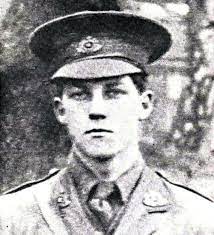
Sorley received a scholarship to University College, Oxford. Before attending, however, he decided to spend sometime in Germany. He spent three months studying language and culture at Schwerin, then enrolled at the University of Jena. When Britain declared war on Germany, he was detained for a brief time, then told to leave the country.
Sorley returned to England and volunteered for military service. He joined the Suffolk Regiment, which arrived at the Western Front in May 1915. Sorley quickly rose from lieutenant to captain. On October 13, 1915 he was killed in action during the Battle of Loos by a sniper’s head shot. His last poem, “When You See Millions of the Mouthless Dead” was discovered in his kitbag after his death.
The first collection of Sorley’s poetry, titled Marlborough and other Poems, was published posthumously and went through six editions in the first year. Sorley’s deeply conflicted attitude about war is evident in his poetry and is likely due to his time in Germany. was from its start. His poetry has been called ambivalent, ironic, and profound. In his autobiographical book Goodbye to All That, Robert Graves counted Sorley, along with Wilfred Owen and Isaac Rosenberg as “the three poets of importance killed during the war.”
'When You See Millions of the Mouthless Dead'

Across your dreams in pale battalions go,
Say not soft things as other men have said,
That you'll remember. For you need not so.
Give them not praise. For, deaf, how should they know
It is not curses heaped on each gashed head?
Nor tears. Their blind eyes see not your tears flow.
Nor honour. It is easy to be dead.
Say only this, “They are dead.” Then add thereto,
“Yet many a better one has died before.”
Then, scanning all the o'ercrowded mass, should you
Perceive one face that you loved heretofore,
It is a spook. None wears the face you knew.
Great death has made all his for evermore.

